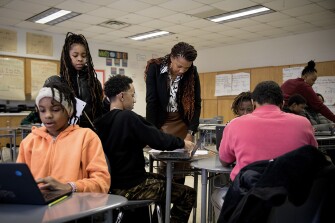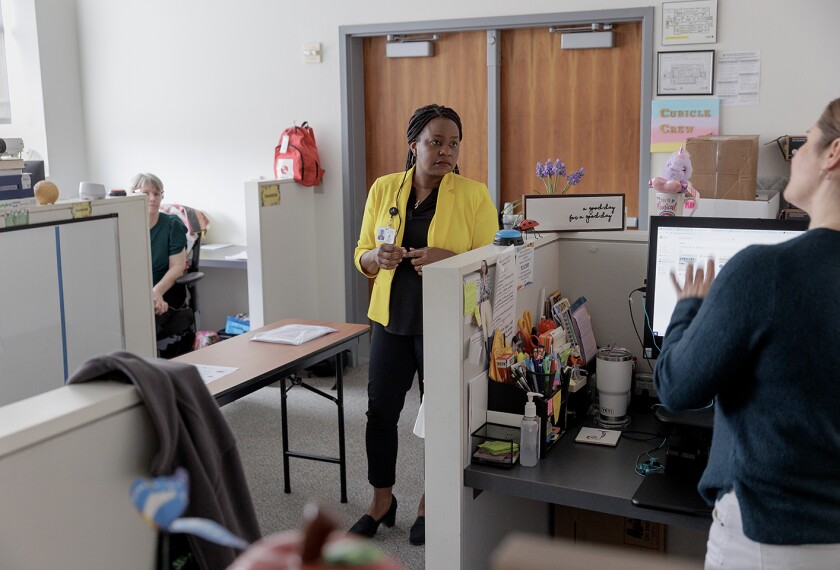Big changes in schools can lead to big emotions, and it’s up to a superintendent to weather the storms of public opinion during transitions.
Aleesia Johnson, 45, the superintendent in Indianapolis, has been working to hold course for a massive and controversial district overhaul, including new attendance zones, grade restructuring, budget reappropriation, and updating the district’s decades-outdated buildings.
The school board unanimously passed the Rebuilding Stronger plan at the end of 2022 without an operating referendum, and implementation won’t be complete until 2024-25, but many of the plan’s most disruptive and antagonizing pieces rolled out this year, including school closures and legal battles over what to do with old campuses.
Despite the criticism, Johnson has successfully pushed for a more than $400 million construction bond, and the district has held attendance steady this year, after a decade of sharp enrollment declines.
Johnson, a 2024 EdWeek Leaders To Learn From honoree, spoke to Education Week about how she has approached engagement during a disruptive year. The interview has been edited for length and clarity.
How did you structure such wide-scale changes?
The school board gave me and my team a list of 10 guiding principles and said, we know there are going to be hard things in that plan, but we also want to ensure that it is anchored in these guiding principles, which are based on what we heard from our community.
We try to be very upfront with our community that we can do anything, but we can’t do everything. I did 12 meetings that were open to our whole community, and then my team met at every single school at least twice to talk about what was happening and get feedback. We kept a running QR code and portal where people could submit questions, and we [published] the answers to those questions on our website. So we worked really, really hard to talk with folks, solicit opinions, [and] get feedback.
There have been some very strong reactions to the plan, particularly around school closures and grade restructuring. How do you handle that?
Not everyone is going to love every decision we make, and that is OK; that’s a part of doing this work. There are tensions we have to manage. We can do anything that we want, but anything that we do is going to require some level of a trade-off, so we’ve got to be real about that and set the community’s expectations around that.
As we built the plan, I would tell my team all the time, we can be engaged to this plan but not married to it, because there might be things that we need to shift and change along the way. We need to be nimble.

Could you give an example of a criticism you have tried to respond to nimbly?
We’ve tried to be clear around the nonnegotiable type things and things that could be negotiable. So, for example, we had one school in the initial version of the plan that was drafted to be demolished and then rebuilt as a high-ability school. This is in a community that is gentrifying quickly, and we heard feedback that the school that we [wanted] to demolish has [a] pretty substantial history in the African American community. So [the community said], ‘We’re not opposed to the high-ability program, but in this particular building at this particular time with how we see our neighborhood changing, it makes us uneasy.”
So we made a different choice. We moved a Montessori program to a close, traditional neighborhood school. And then the high-ability program will be built on a new campus that’s also probably about two miles and a half away from [the school being closed]. And now, we are engaging along the way with the historic landmark society as we think about what will be done with the building. That community is gentrifying; it’s really struggling with affordable housing. And so, there’s an opportunity to think about that school and reimagining the location for affordable housing.
How has your background in social work affected how you lead during this transition?
It deeply informs my leadership and how I show up every day. Obviously, there’s a lot of data driving the decisions we make, but we can’t lose sight of anchoring it in the people who we are connected to and caring for. I try to keep that really at the forefront.
I try very much to lean into the humanity of this experience, because it is hard and it is devastating. I took no pleasure in going to schools and talking to families about, you know, a disruption that they had not asked for.
I try to, as a leader, really acknowledge that this isn’t just a pragmatic tactical exercise on paper. There is grieving, and there is pain, and there is hurt that goes along with this. These are communities where people care about our staff. You may be separating from someone you’ve worked with for a decade or a school you’ve worked at for two decades. That is sad, and I just think it’s really important to name the emotion as a part of this process. Yes, on the other side of this, we actually believe it’s going to be better for kids—I believe that deeply—but I also know there is sadness and grief and anger and disappointment that might also be accompanying even those feelings of hope and optimism that we hold. And those things are OK. We can hold both of those things and we can acknowledge them.







